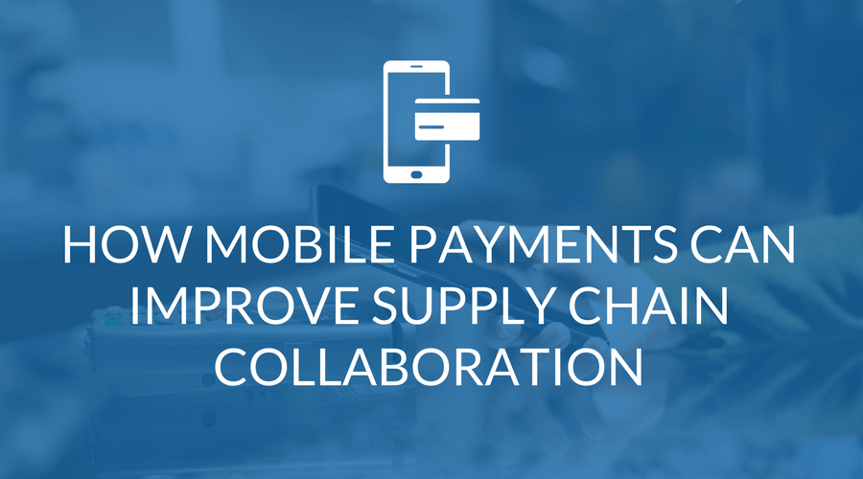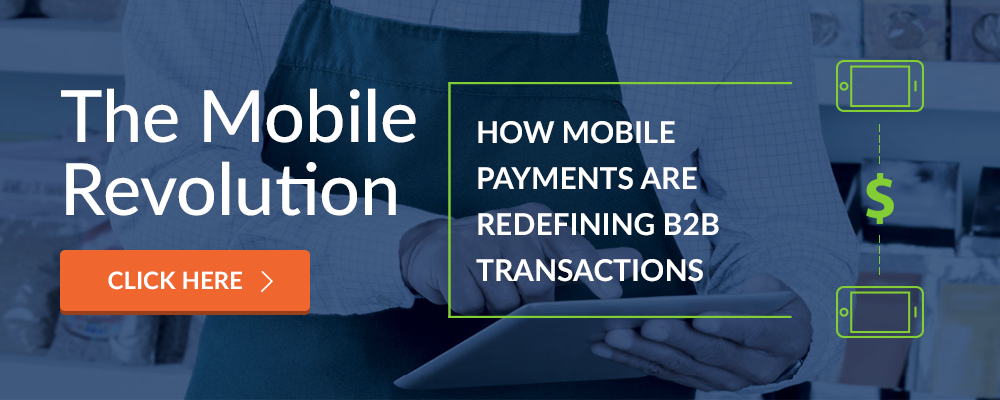
Mobile technology has taken off in recent years, with more flexible payment ecosystems giving retailers ways to improve supply chain collaboration. By adopting mobile technology in B2B payments, retailers and suppliers can not only build on partnerships, but can greatly benefit from data transparency. Both these factors are long-standing challenges for supply chain managers.
However, some in the retail sector are not easily convinced. There are, understandably, some fears that are keeping businesses from taking the leap to B2B mobile payments. Let’s take a look at some and address them here.
Fear #1: Mobile Payments Aren’t Secure
Getting management support for mobile payments may require more than a few high-level meetings. Yet, apprehension around mobile payments also preceded the B2C sector before taking hold. In 2015, mobile proximity payment users totaled 23 million; this is expected to be in the region of 70 million by 2019. The truth is that mobile payments have evolved into a far more secure payment alternative than existing systems. What’s more, mobile is less susceptible to human error or misconduct than paper or card payments.
While the introduction of EMV card technology saw a decrease in POS-level scams, it shifted fraudsters attention to card not present (CNP) fraud. This type of fraud occurs when your company's card's details end up in the wrong hands. With many people in close proximity to company credit cards, paying by plastic is still racked with loopholes. Large companies with many cards to audit and account for can suffer considerable losses when card access and usage go unchecked.
Mobile payments use cloud-hosted infrastructure, where payment records are monitored in real-time. Players across supply chains can access financial data for approvals or reporting, for visibility into financial processes. Transactions between suppliers and retailers occur on secure, encrypted connections. Moreover, tokenization technology has evolved to secure mobile payments even further, thus creating environments that are conducive to safe, and effective supply chain collaboration.
Fear #2: Mobile Payment Systems Are Complex And Expensive
People are, by nature, skeptical about adopting anything new. Mobile payments are no exception. Furthermore, convincing CFOs to invest in new technology can be tough. IT investments typically mean more CAPEX expenses, with hardware that devalues all too fast. However, this is primarily true for the IT of yesteryear.
Cloud-based technology has transformed the way hardware and software is deployed. Mobile payment systems are native to the cloud, meaning they come with virtually no hardware costs. Moreover, many businesses already have company devices in circulation amongst their employees, making mobile payments a natural progression. On the software side, subscriber (pay-per-use) payment models are replacing CAPEX investments that require large upfront financial commitment.
ROI is the measuring stick for any newly implemented project. Compared to paper-based billing and payments, mobile technology pays for itself almost immediately. The low barrier to adoption makes it easy to implement across any business.
Fear #3: We Don’t Need Yet Another Disruption
Many business managers argue that mobile payment adoption is lengthy and comes a with steep learning curve. This is a common argument among busy retailers and suppliers who can’t afford weeks, or months, of staff onboarding. However, the technology's ubiquity and cultural integration makes it the perfect vehicle for better payments. Learning curves are as easy as learning a new app, while security is handled on a powerful cloud back end.
Doubts around data integrity and availability are also a common sticking point. Financial systems rely on predictable access to data for the smooth management of billing and payments. However, the ability of existing systems to do this effectively has always been racked with complexities. Invoices, checks, cash, and legacy systems make billing and payments complex, while undermining opportunities for better supply chain collaboration.
For example, a simple discrepancy caused by breakage during goods transit can take weeks to resolve. Issuing credit to retailers takes notoriously long on paper when managers need to be tracked down for approvals. These days, mobile b2b payments make resolving issues such as these virtually instantly, as payments and shipping data can be adjusted from within the payment app.
Fear #4: Stakeholders Won't Buy Into Mobile
Many retailers consider electronic payments, but are dissuaded by the idea that it may cause friction with suppliers. Yet, suppliers have a lot to gain from mobile payments. The overheads involved in the handling of cash, insurance, and the costs associated with theft can amount to millions for national suppliers and distributors. In 2015, U.S retailers wrote off $50 billion to stock shrinkage, up $3 billion from the previous year.
Digitizing the transfer of large sums of money mitigates all of the aforementioned factors. Further, the open lines of communication between suppliers and retailers offers both a wide range of benefits. For example, retailers have by-the-minute views of stock movements, while suppliers can issue invoices and expect shorter turnaround on payments.
There's Nothing To Fear And Much To Gain With Mobile
Mobile payment technology will need to earn it’s place in the B2B payments sector. This is especially true in the fast-moving world of retail. However, its capacity to foster better supply chain collaboration and provide access to integrated business data makes it the perfect successor to paper-based systems. Decision makers have little time to invest in alternatives that only slow them down.
Yet, the realities of mobile technology point to a better way of working across the entire supply chain. To learn more about how mobile payment technology can help your business, contact us today.
